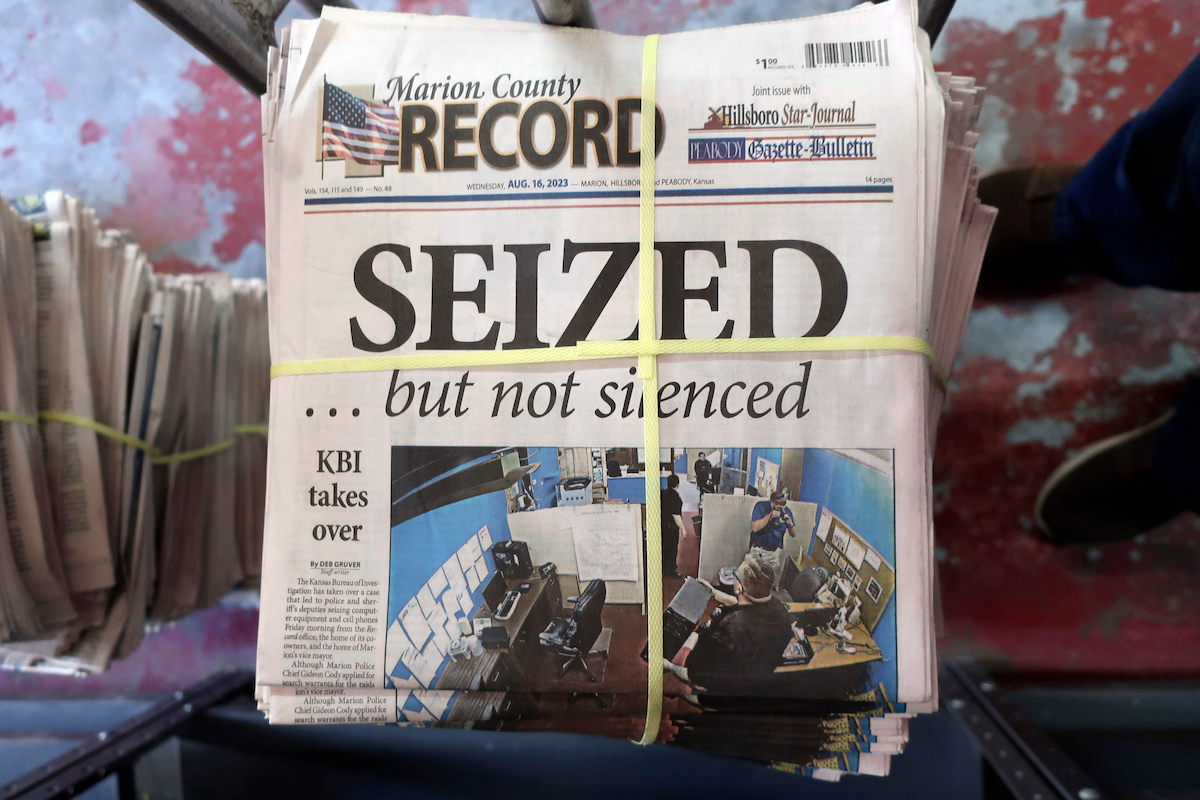Two big takeaways from the Marion County Record raid investigation

If you like this post, sign up to get The Nuance newsletter delivered straight to your inbox every Sunday night!
Today is the one-year anniversary of the Marion Police Department’s raid on the Marion County Record’s newsroom and the home of its publishers. And last week, investigators released their final report on the matter.
The report, signed by two county attorneys serving as special prosecutors, is worth a close read in its entirety (all 124 pages). It finds no basis for criminal liability for any of the players involved — including the Record’s reporters and publishers. The only exception is Marion Police Chief Gideon Cody, who the report says will be charged for “Obstruction of Judicial Process” in connection with certain text messages he allegedly sent after the execution of the search warrants. (The report itself does not include a detailed accounting of those findings, which “will be incorporated into charges” sought in Marion County.)
There’s plenty of detail for the curious in the report, but it offers two takeaways of particular note.
First, it confirms that the whole kerfuffle appears to have been the result of an initial misunderstanding by officers regarding whether a state website that a journalist at the Record accessed as part of her reporting was open to the public.
To recall, the case started when a local restaurant owner’s now ex-husband checked the status of the owner’s license, which had been suspended because of a DUI several years earlier. He then circulated images of that report to others, and it ultimately made its way to the Record. A reporter at the Record then used that state website to confirm its accuracy.
In the special prosecutors’ investigation, counsel for the state agency clarified with outside investigators that the agency does not consider accessing the information a crime because it is just “status information,” but officers reportedly believed, based on a confusing and very brief conversation with someone at the agency, that the ability of the public to access the relevant information was due to a “loophole.”
The report is critical, however, of that initial confusion. In finding insufficient evidence that Cody committed a crime in connection with the warrants, the authors write, “it is not a crime under Kansas law for a law enforcement officer to conduct a poor investigation and reach erroneous conclusions.”
The report then finds that those errors were compounded by local officers “jumping the gun,” as two individuals quoted in the report put it, and executing the warrants before their contacts at Kansas Bureau of Investigation had consulted with computer crime specialists.
But the biggest takeaway — by far — is the report’s affirmation of the importance of a “subpoena-first” approach when journalists are themselves suspected of a crime. The report’s conclusion is worth quoting in full:
Journalists, attorneys, mental health professional [sic] and members of the clergy each have long-recognized privileges in our law rooted in the freedom of religion, freedom of the press and right to legal representation. When a member of one of these professions becomes a suspect in a crime, law enforcement has the ability to investigate. However, in these situations, it is incumbent on law enforcement to take precautions to limit the scope of their investigation. Before a search warrant is sought for a press room, a law office, church or the office of a mental health professional, inquisition subpoenas or other available forms of investigation should be utilized. Search warrants for law offices, press rooms and churches should be sought only in extraordinary circumstances and with extreme caution.
As we emphasized in a coalition letter we wrote, signed by 34 national news organizations and press groups, and sent to Cody immediately after the raid, the inexcusable thing here was the use of a search warrant, which “are among the most intrusive actions law enforcement can take with respect to the free press” and the “most potentially suppressive” of free speech by the press and public.
The fallout from the Marion raid illustrates why. Even assuming an honest mistake by officers, the newsroom’s operations were halted and sensitive newsgathering information unconnected to the case was swept up (including source identity information and unreported material on the police chief himself). Subpoenas, by contrast, provide recipients an opportunity to negotiate their scope or to challenge them in court before the “bell has rung.”
Here, because a warrant was used as a first resort, the damage is irremediable.
The Technology and Press Freedom Project at the Reporters Committee for Freedom of the Press uses integrated advocacy — combining the law, policy analysis, and public education — to defend and promote press rights on issues at the intersection of technology and press freedom, such as reporter-source confidentiality protections, electronic surveillance law and policy, and content regulation online and in other media. TPFP is directed by Reporters Committee attorney Gabe Rottman. He works with RCFP Staff Attorney Grayson Clary and Technology and Press Freedom Project Fellow Emily Hockett.